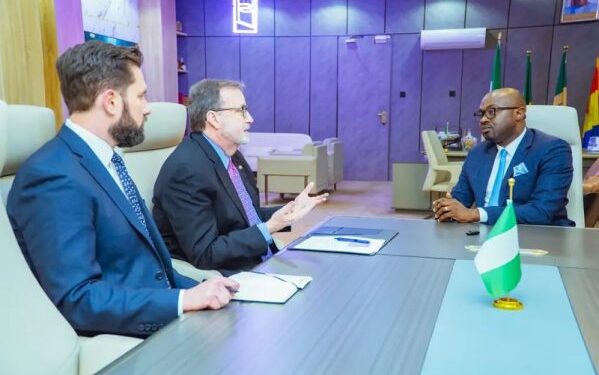Nigeria’s Interior Minister, Olubunmi Tunji-Ojo, engaged in high-level diplomatic discussions with United States Ambassador Richard Mills on Wednesday in an effort to address the contentious new visa restrictions imposed on Nigerian citizens by the American government.
The crucial meeting, held at the ministry’s headquarters in Abuja, brought together key immigration officials from both nations as Nigeria grapples with the implications of Washington’s decision to dramatically reduce visa validity periods for its citizens.
Ambassador Mills was joined by senior Nigerian officials including Kemi Nanna Nandap, Comptroller-General of the Nigeria Immigration Service, and Magdalene Ajani, Permanent Secretary of the Ministry of Interior, signaling the importance both governments place on resolving the emerging diplomatic tension.
The discussions centered on the sweeping changes announced by the US Embassy just one day earlier, which will see most non-immigrant and non-diplomatic visas for Nigerians reduced to three-month validity periods with single-entry restrictions. The policy represents a significant departure from previous arrangements that typically granted longer validity periods and multiple entries.
Minister Tunji-Ojo characterized the diplomatic engagement as “constructive,” noting that Ambassador Mills provided comprehensive explanations about the rationale behind the new procedures. According to the minister, the US envoy emphasized that the changes align with international standards designed to preserve immigration process integrity.
The American diplomat reportedly outlined how the revised protocols reflect broader concerns about visa compliance and security considerations that have influenced US immigration policy adjustments worldwide. The restrictions are expected to impact thousands of Nigerian travelers, including business professionals, students, and tourists seeking to visit the United States.
In a significant development during the meeting, both sides agreed to strengthen bilateral cooperation on immigration matters, particularly focusing on visa regulation enforcement and promoting responsible travel practices among Nigerian citizens. The commitment suggests both nations recognize the need for collaborative approaches to address underlying concerns that prompted the policy changes.
The Nigerian government made several concrete commitments during the discussions, including implementing enhanced measures for issuing secure travel documents with verified identities. Officials also pledged to improve visa overstay management systems and facilitate better exchange of security and criminal record information to support public safety objectives.
One positive outcome of the diplomatic engagement was the US endorsement of Nigeria’s electronic visa system, which Minister Tunji-Ojo said aims to enhance and simplify the visa application experience for foreign travelers visiting Nigeria. The endorsement could signal potential reciprocal benefits for Nigerian travelers as both countries work to modernize their immigration processes.
The timing of the meeting underscores the urgency with which Nigerian authorities are addressing the visa restrictions, which caught many potential travelers off guard. The policy changes affect a broad spectrum of Nigerian applicants, from business executives seeking to attend conferences to students pursuing educational opportunities in the United States.
Industry observers note that the restrictions could have significant economic implications for Nigeria-US relations, particularly affecting trade missions, academic exchanges, and tourism flows between the two nations. The reduced validity periods and single-entry limitations may discourage business travel and complicate planning for Nigerian companies with American operations.
The diplomatic discussions also touched on broader immigration challenges facing both countries, including concerns about document fraud, overstay rates, and security verification processes. Both sides acknowledged the need for continued dialogue to address these systemic issues while maintaining strong bilateral relations.
Nigerian officials expressed hope that the constructive nature of the talks could lead to future adjustments in the visa policy, particularly if the country demonstrates progress in implementing the security and documentation improvements discussed during the meeting.
The meeting represents the first high-level diplomatic response to the visa restrictions, which have generated considerable concern among Nigerian travelers and business communities. Many affected individuals and organizations are closely watching for any signs of policy modifications that might emerge from ongoing diplomatic efforts.
As both nations work to balance security concerns with maintaining robust people-to-people connections, the outcome of these diplomatic discussions may determine whether the visa restrictions represent a temporary adjustment or a more permanent shift in US-Nigeria immigration relations.
The Interior Ministry indicated that further consultations with American officials are planned as both countries seek to address the underlying issues that prompted the policy changes while preserving the strong bilateral relationship between Nigeria and the United States.

















